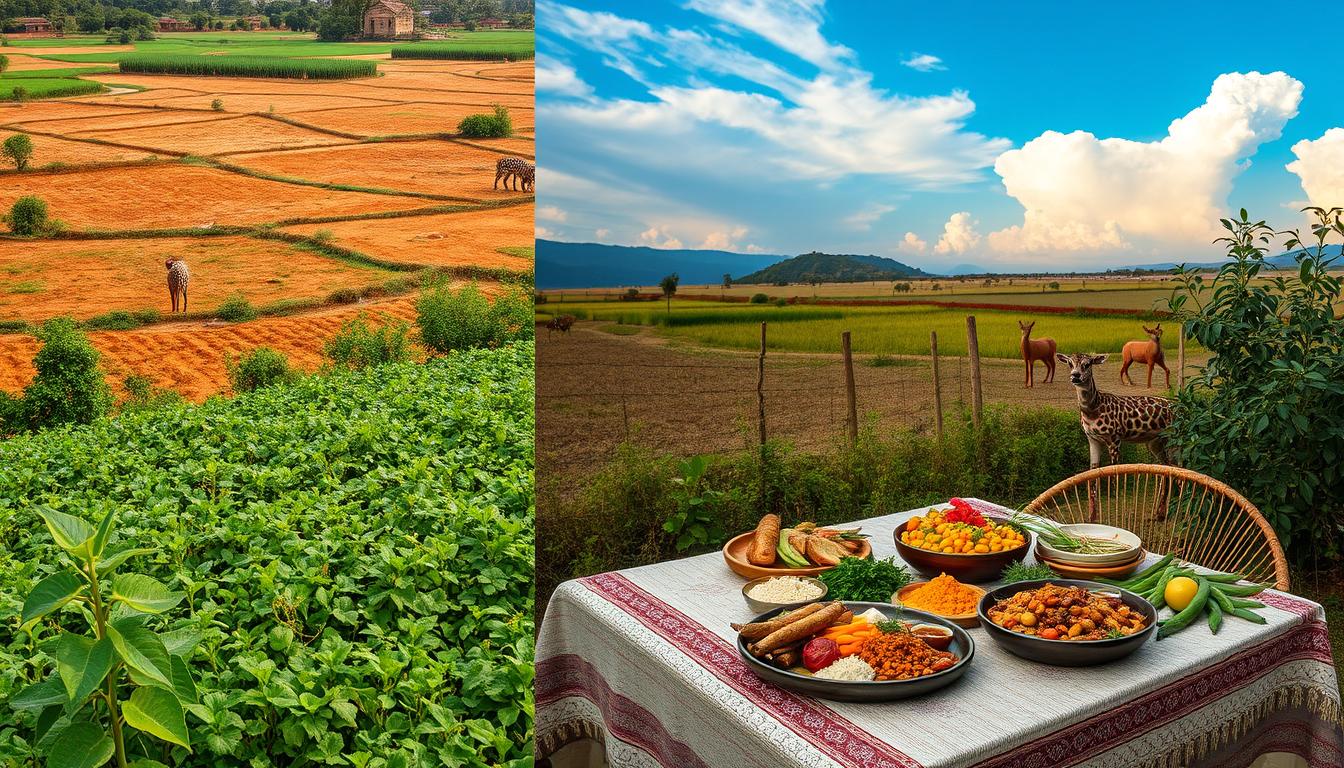Pakistan is facing big challenges from climate change. It’s hard to keep food secure and have sustainable diets for everyone. The country’s weather is getting wilder, with more heatwaves and droughts. This is hurting the farms and making crops grow less.
Climate change is making people eat more plants to get enough food. This change is good for health but also affects the planet. The way we grow food is making the Earth warmer.
To solve this problem, we need to do many things. We must use better farming methods and support policies that help farms survive climate change. We also need help from around the world. And we can all help by choosing food that’s better for the planet.
Key Takeaways
- Climate change is significantly impacting crop yields and food security in Pakistan, leading to a shift towards more plant-based diets.
- Sustainable farming practices, government policies, and international support are crucial for building climate-resilient agriculture.
- Individuals can contribute by making eco-friendly meal choices and promoting regenerative agriculture techniques.
- The carbon footprint of food production is a growing concern, requiring a focus on low-emission recipes and sustainable eating habits.
- Addressing the crisis requires a holistic approach that encompasses environmental, nutritional, and social factors.
Rising Temperatures and Erratic Weather Patterns
The agricultural sector in Pakistan is facing big challenges due to climate change. Rising temperatures and unpredictable weather patterns cause more frequent and severe heatwaves and droughts. These changes deeply affect crop yields and productivity.
Heatwaves and Drought Affecting Crop Yields
Prolonged heatwaves and droughts have damaged staple crops a lot. This has led to reduced harvests and food shortages. These extreme weather events disrupt planting and harvesting schedules. It makes it hard for farmers to keep consistent crop yields.
Increased Frequency of Extreme Weather Events
Heatwaves and droughts are not the only issues. The frequency of floods and heavy rainfalls has also gone up. These sudden and intense weather patterns make it even harder for the agricultural sector. They hinder efforts to ensure food security in the region.
“Climate change is not just a distant threat, but a pressing reality that is already impacting the lives of farmers and communities in Pakistan.”
As the effects of climate change, heatwaves, and drought get worse, the need for sustainable and resilient farming grows. It’s crucial to address the crop yields and extreme weather events that threaten food security in Pakistan.
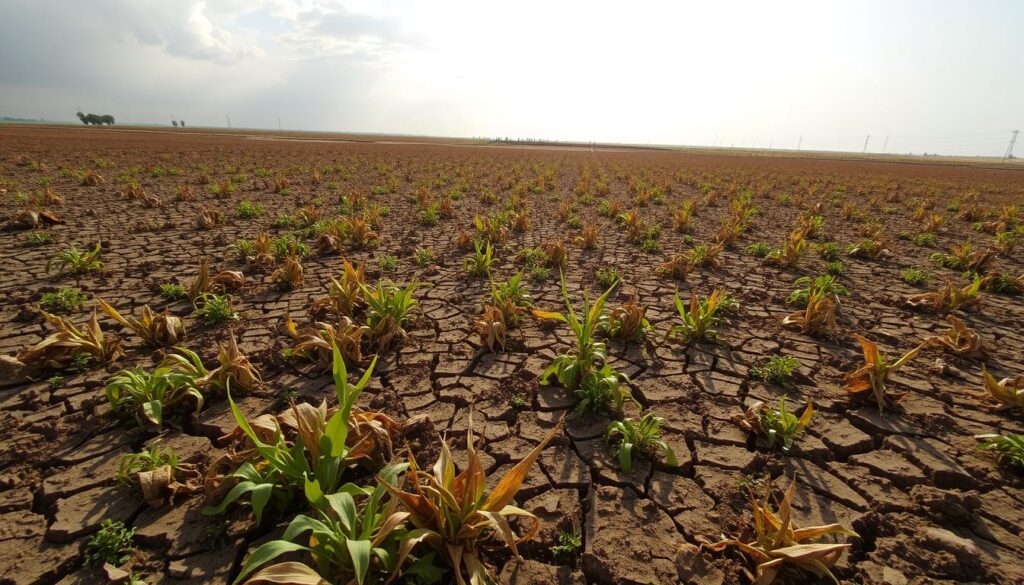
Climate Change’s Toll on Agriculture
Climate change is hitting Pakistan’s agriculture hard, leading to less food and more hunger. Heatwaves, droughts, and extreme weather are cutting down crop yields. This makes it tough for farmers to feed the growing population.
Food prices are going up, and many can’t afford healthy food. Hunger and malnutrition are on the rise. We need to tackle climate change to save our farms and food security.
Declining Productivity and Food Insecurity
Climate change is making it hard to grow food in Pakistan. Crops like wheat, rice, and veggies are failing. This means less food for everyone, leading to higher prices and hunger.
- Decreased crop yields due to heatwaves, droughts, and extreme weather events
- Rising food prices and limited access to affordable, nutritious food
- Increase in the number of people facing hunger and malnutrition
We need a plan that fights climate change, promotes green farming, and supports farmers. This will help Pakistan stay food secure for the future.
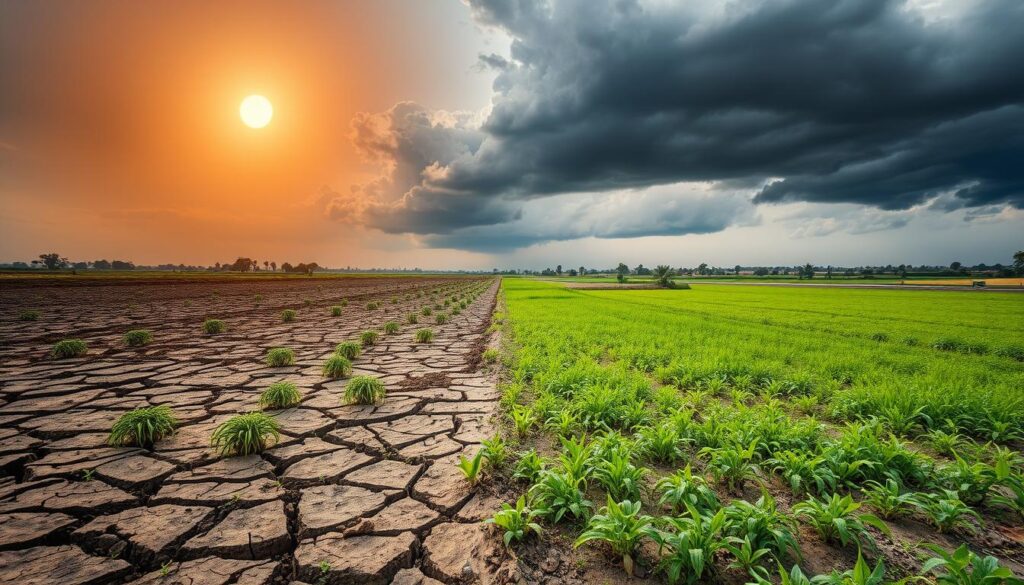
“The effects of climate change on agriculture are far-reaching, threatening the livelihoods of millions of farmers and the food security of the entire nation. Urgent action is needed to address this crisis and secure a sustainable future for Pakistan’s food system.
Shifting Dietary Patterns and Nutrition
Climate change has changed how people eat in Pakistan. With fewer crops and higher food costs, many now eat more plant-based diets. They focus on local fruits, veggies, and grains.
Transition to Plant-Based Diets
This change has both good and bad sides for nutrition. Some families find it hard to get all the nutrients they need. Yet, eating more plants can help our planet and fight climate change.
“By transitioning to more plant-based diets, we can not only improve our health and nutrition, but also play a role in addressing the food security challenges posed by climate change.”
Families are turning to plant-based diets out of need and knowledge. Climate change makes old ways of growing food hard. So, families adapt to eat what’s available and affordable.
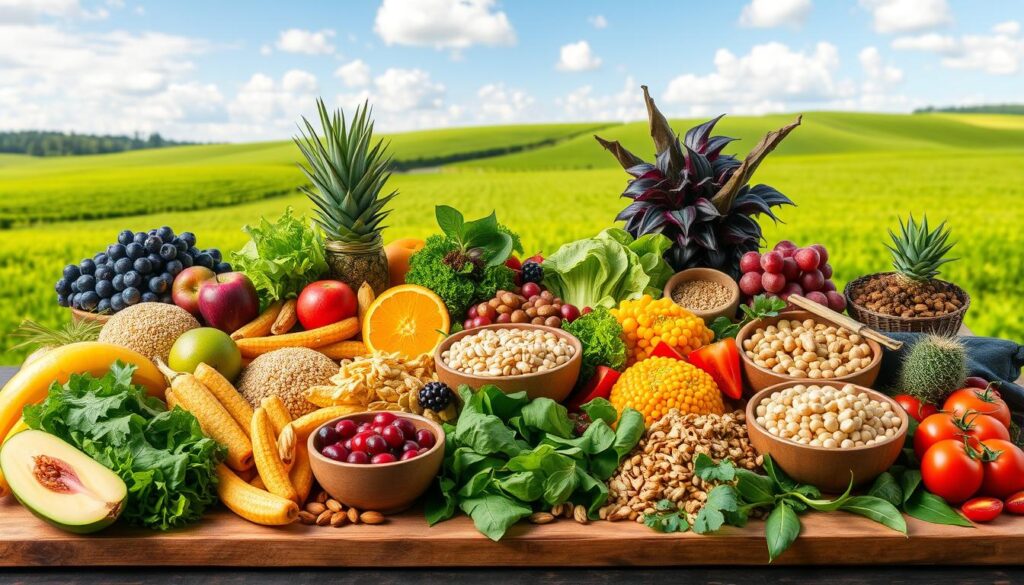
- Increased reliance on locally-grown fruits and vegetables
- Reduced consumption of meat and dairy products
- Emphasis on grains, legumes, and other plant-based protein sources
This change brings challenges but also chances for better eating. It helps with food security and makes our planet stronger.
Climate Change Diet
In Pakistan, the idea of a “climate change diet” is becoming more popular. It focuses on eating in a way that’s good for the planet. This means eating more plants, less meat and dairy, and choosing foods that are better for the environment.
By trying low-emission recipes and planning meals that are kind to the earth, people in Pakistan can help fight climate change. They can make their diets more sustainable and support the planet.
The climate change diet has some main rules:
- Eat more fruits, veggies, whole grains, and legumes.
- Eat less meat and dairy, as they harm the environment more.
- Choose sustainable eating options that are good for the planet.
- Use low-emission recipes to cut down on carbon emissions.
- Use eco-friendly ways to cook and reduce food waste.
By following the climate change diet, people in Pakistan can help make our food system better. They play a big part in fighting climate change.
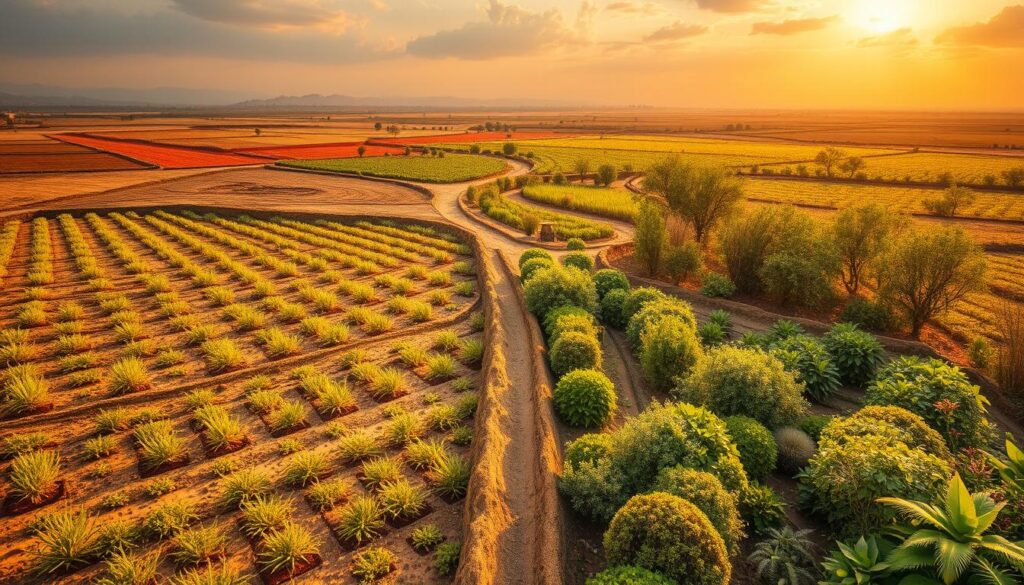
“The future of our planet depends on the choices we make today. By adopting a climate change diet, we can make a tangible difference in reducing the environmental impact of our food choices.”
Sustainable Farming Practices for Adaptation
Climate change is hitting Pakistan’s farms hard. To adapt, farmers must use sustainable farming. This means saving water and growing many different crops.
By saving water and using it wisely, farmers can make the most of what they have. Growing a variety of crops helps them deal with bad weather. This makes farming more stable and food more secure.
Water Conservation and Efficient Irrigation
Water is getting scarcer, and droughts last longer. Saving water is key. Drip irrigation systems are a good start. They send water right to the roots, cutting down on waste.
Using soil moisture sensors is another smart move. These tools help farmers water just the right amount. This saves water and helps crops grow better.
Crop Diversification and Resilient Varieties
Planting different crops is a smart move. It makes farms less vulnerable to climate change. This way, farmers can fight off pests and diseases better.
Using seeds that can handle tough weather is also important. These seeds help farmers keep growing food, even when the weather is bad.
By using these methods, Pakistani farmers can face climate change head-on. They help keep the country’s food system strong for the future.
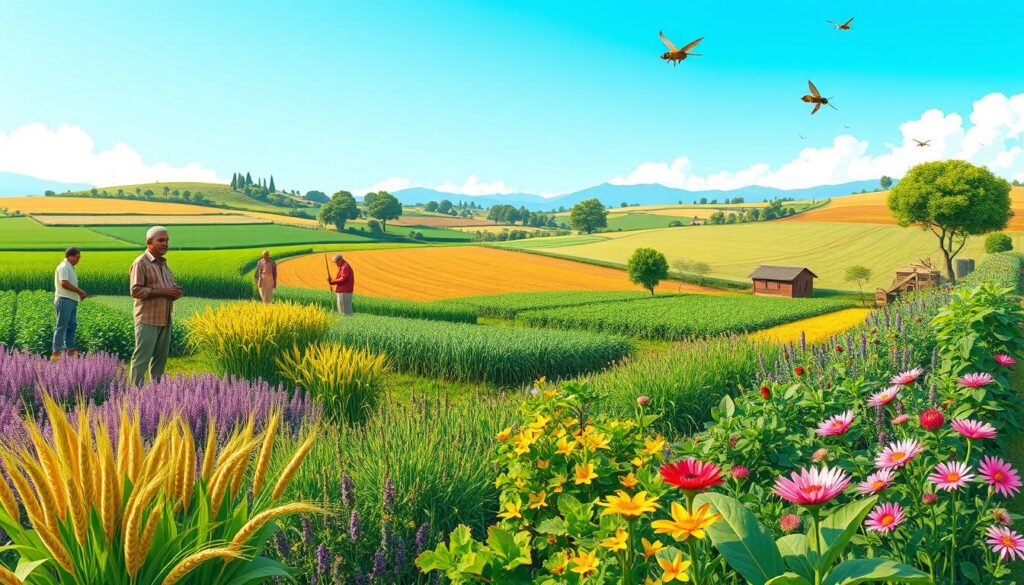
“Sustainable agriculture is not just a buzzword, but a necessity in the face of climate change. By adopting water-efficient irrigation and diversifying crop selection, we can build a resilient food system that ensures food security for generations to come.”
Government Policies and Initiatives
The Pakistani government knows they must act fast to face food security threats from climate change. They have started strong policies and plans to help the farming sector. These efforts aim to support farmers and encourage farming that can handle climate changes.
The government’s main plan is to make farming more resilient. They offer subsidies and financial help to farmers. This lets them use better farming methods and grow crops that can survive droughts. The goal is to keep food security safe from climate change.
The government also works closely with international organizations. This partnership brings in global knowledge and expertise. It helps Pakistan strengthen its farming sector and ensure food security for the long term.
Moreover, the government is investing in research and development. This has led to new farming methods and crops that can handle droughts. These are key for making farming more productive and sustainable in Pakistan.
With these government policies and actions, Pakistan is taking steps to protect its farms. They aim to keep the country’s food supply safe from the growing climate crisis.
Role of International Organizations
International organizations have been key in helping Pakistan face food security challenges due to climate change. They offer technical help, funding, and resources. This support is crucial for Pakistan to adopt sustainable farming, better water use, and crop variety.
Support for Climate-Resilient Agriculture
These groups work closely with Pakistan’s government and local people. They help farmers adapt to climate change and keep farming strong. They introduce climate-resilient agriculture methods like drought-tolerant crops and efficient irrigation.
Groups like the Food and Agriculture Organization (FAO), the International Fund for Agricultural Development (IFAD), and the World Bank team up with Pakistan. Together, they create plans to boost food security and support international organizations in Pakistan.
“These international organizations have been instrumental in building the capacity of farmers to adapt to the changing climate and ensure the long-term viability of the agricultural sector.”
Thanks to these efforts, Pakistani farmers and communities are better prepared for climate change. This ensures Pakistan’s farming can still feed its growing population.
Carbon Footprint of Food Production
Food production, especially meat and dairy, harms the environment a lot. It adds to the carbon footprint. In Pakistan, where food security is a big challenge, we must look at how our food system affects the planet.
Environmental Impact of Meat and Dairy
Meat and dairy production have a big environmental cost. They cause a lot of greenhouse gas emissions, use a lot of water, and damage land. If people in Pakistan eat less meat and dairy and more plants, they can help fight climate change.
A study by the World Resources Institute found that meat and dairy production cause about 14.5% of global greenhouse gas emissions.
- Meat production leads to deforestation and more land use, making the climate crisis worse.
- Dairy farming uses a lot of water, leading to water shortages in places like Pakistan.
- Livestock also produce methane, a strong greenhouse gas that traps heat.
By focusing on the environmental impact of food, especially meat and dairy, Pakistanis can help fight climate change. This way, we can ensure a more sustainable and food-secure future.
Eco-Friendly Meal Planning and Low-Emission Recipes
Pakistanis are now focusing on eco-friendly meal planning and low-emission recipes. This means choosing local, seasonal foods and eating more plant-based. It also means avoiding foods that are bad for the planet.
By choosing eco-friendly meals, Pakistanis can help fight climate change. This change helps the planet and makes people healthier too.
Low-Emission Recipes for a Climate-Friendly Diet
Switching to a climate-friendly diet means eating less meat and dairy. These foods are better for the planet and our health. They help reduce greenhouse gases and can lower the risk of diseases.
- Lentil and vegetable curries
- Quinoa and roasted vegetable salads
- Tofu and mushroom stir-fries
- Chickpea and spinach stews
“By embracing eco-friendly meal planning and low-emission recipes, we can all play a role in building a more sustainable food system and mitigating the impact of climate change.”
Adopting these eating habits is good for the environment and supports local farmers. It helps Pakistanis face climate change with a strong food system. This ensures a healthy and sustainable food future.
Regenerative Agriculture and Soil Health
Regenerative agriculture is a key solution for Pakistan’s agriculture facing climate change. It improves soil health with methods like cover cropping and reduced tillage. Organic matter is also added to the soil.
Farmers using regenerative practices can make their land more resilient. They can also increase crop yields and help the food system last longer. The Pakistani government and international groups are helping farmers learn about these methods.
Promoting Sustainable Farming Techniques
Regenerative agriculture focuses on creating healthy, nutrient-rich soil. Techniques being used include:
- Cover cropping: Planting cover crops to prevent soil erosion and improve soil structure
- Reduced tillage: Minimizing soil disturbance to retain organic matter and promote microbial activity
- Organic matter incorporation: Adding compost or manure to enhance soil fertility and water-holding capacity
These practices not only improve soil health but also make farming more resilient to climate change. This includes better handling of heatwaves, drought, and extreme weather.
“Regenerative agriculture is not just about growing food – it’s about rebuilding the health of our soils and ecosystems, which is essential for securing a sustainable future.”
By adopting regenerative agriculture, Pakistan can ensure food security. It also promotes farming practices that are resilient to climate change.
Individual Choices and Dietary Shifts
Addressing climate change in Pakistan’s food security needs a big effort from everyone. But, what we eat can also help a lot. By choosing a climate-friendly diet, we can lower our carbon footprint and support green food systems.
Choosing plant-based foods and picking eco-friendly meals can make a big difference. It shows we care about the planet and want a food system that’s strong against climate change.
When we make smart food choices, we set an example for others. This can lead to a big change in how we eat. Together, we can make Pakistan’s food future greener and more sustainable.
- Rising Temperatures and Erratic Weather Patterns
- Climate Change's Toll on Agriculture
- Shifting Dietary Patterns and Nutrition
- Climate Change Diet
- Sustainable Farming Practices for Adaptation
- Government Policies and Initiatives
- Role of International Organizations
- Carbon Footprint of Food Production
- Eco-Friendly Meal Planning and Low-Emission Recipes
- Regenerative Agriculture and Soil Health
- Individual Choices and Dietary Shifts
